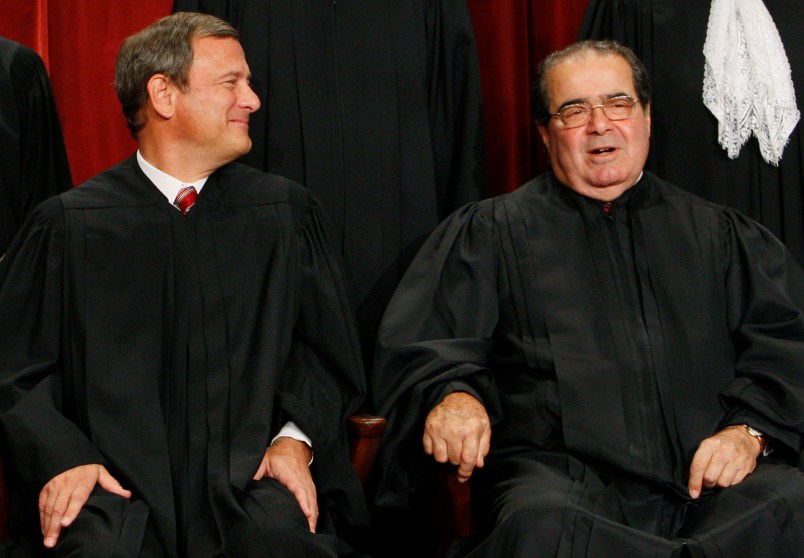Conservatives on the U.S. Supreme Court might have already tipped their hand on the latest substantial legal threat to Obamacare, according to one Yale law professor. And if they did, it would be good news for the Obama administration.
A federal appeals court in Washington, D.C., ruled Tuesday that Obamacare’s language did not allow people shopping on HealthCare.gov to access tax credits if they purchase insurance through the federal website. If that decision were to become law, affecting the 36 states served by the federal exchange, it would strip subsidies from nearly 5 million people and send their premiums skyrocketing. Without some sort of administrative rescue from the Obama administration, it would significantly gut the law.
Another federal appeals court in Virginia ruled the opposite way on the same day. Legal analysts have said it is at least possible that the case will end up in front of the Supreme Court, which largely upheld Obamacare in 2012. But the court’s conservative streak has struck down some of the law’s other provisions.
Abbe Gluck, a law professor at Yale University, highlighted some passages this week for a piece for Politico that showed how the court’s conservative justices seemed to have already interpreted the issue in the 2012 ruling.
“It was Justice Scalia himself … who interpreted the health reform statute precisely this way in the 2012 health reform case,” Gluck wrote, “holistically, and assuming the statutory text makes subsidies available on state and federal exchanges alike.”
Though they would have ruled Obamacare unconstitutional as a whole, the justices did not, according to Gluck’s analysis, appear to even consider that the tax credits would not be available through HealthCare.gov. In fact, she argued, they seemed to assume exactly the opposite.
Gluck referenced three sections of the 2012 conservative dissent.
Congress provided a backup scheme; if a State declines to participate in the operation of an exchange, the Federal Government will step in and operate an exchange in that State.
Obamacare advocates and drafters have indeed argued that the federal exchange was intended as a back-up plan, rather than the punitive measure that those bringing the most recent lawsuit have alleged.
In the absence of federal subsidies to purchasers, insurance companies will have little incentive to sell insurance on the exchanges. … That system of incentives collapses if the federal subsidies are invalidated.
The federal judges who invalidated tax credits through HealthCare.gov said the law could continue operating even without the subsidies. The justices appear to disagree here.
By 2019, 20 million of the 24 million people who will obtain insurance through an exchange are expected to receive an average federal subsidy of $6,460 per person.
As Gluck noted, those figures “only make sense” if one assumes that those on the federal exchange are receiving subsidies.
Those passages aren’t a guarantee that the justices wouldn’t vote to disallow subsidies through HealthCare.gov, Gluck told TPM. But they suggest that even some of the law’s most ardent opponents seemed to think that the law intended for the tax credits to be available on the federal exchange.
“The importance of the quote from the 2012 decision is that it shows how the challengers’ position in the subsidies cases is so made-up and at odds with the entire structure of the rest of the statute that it was something no one — not even the 2012 dissenters — even remotely suspected Congress could have intended,” she said.
But those sections of the 2012 dissent are not binding precedents, Gluck said, and the conservative justices could still conceivably rule that the tax credits are invalid through HealthCare.gov — even if it might look a little strange following their 2012 opinion.
“The court could come out in a way that contradicted those statements. They would argue, for example, that the question wasn’t before them then,” she said. “But they would have a lot of explaining to do and would likely take heat from the other justices for it.”
That was the consensus shared by some other legal experts.
Gluck’s analysis “raises good points about the widely shared understanding — even among the most conservative justices! — of the meaning of the ACA,” Nicholas Bagley, a law professor at the University of Michigan, told TPM in an email.
“But could the conservative justices get around what they said? Probably,” he continued. “The four dissenters may have been speaking too generally about the ACA to consider themselves bound to any particular view on the specific statutory question” raised in the tax-credit lawsuit.
As Tim Jost, a health law professor at Washington and Lee University who supports Obamacare, put it to TPM: “One of the perquisites of being a life-appointed judge is that you can do anything you want, including changing your mind.”







The SupremeCorporation K-RATS don’t need to deliberate…
Koch addiction makes it an unnecessary .
Scalia doesn’t rely on internal consistency…even his own words are often ignored to fuel his ODS rantings.
Roberts maybe…I still think he might be trying to preserve some legacy of ‘his’ court as being something other than a tool for the RWNJ’s…but even that is fading fast.
" … even if it might look a little strange …"
Yeah, I’m comforted.
These political appointees make it up as they go along.
It is adorable that someone would think Scalia would be consistent if he can screw over Obama to do otherwise.
If Scalia doesn’t screw Americans over this time, watch for him to make sure a Republican becomes President next election, like SCOTUS did with Chimipy the Decider.